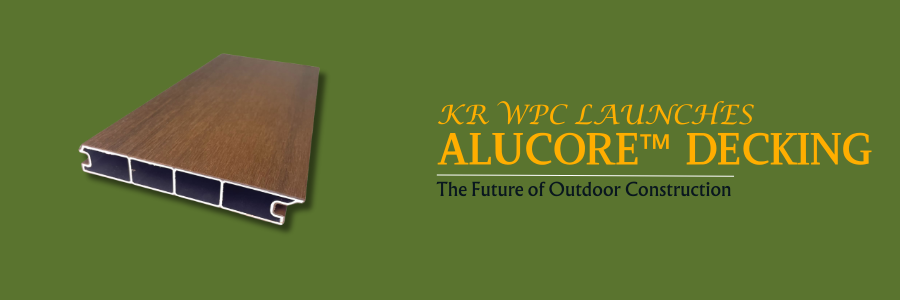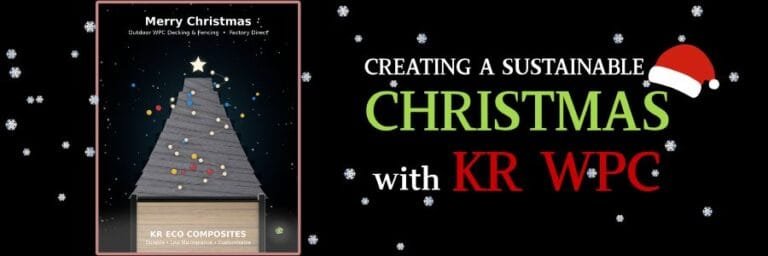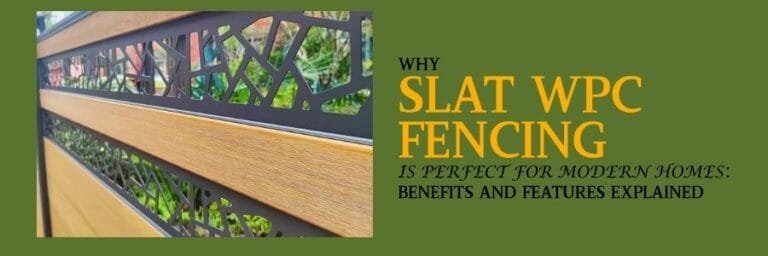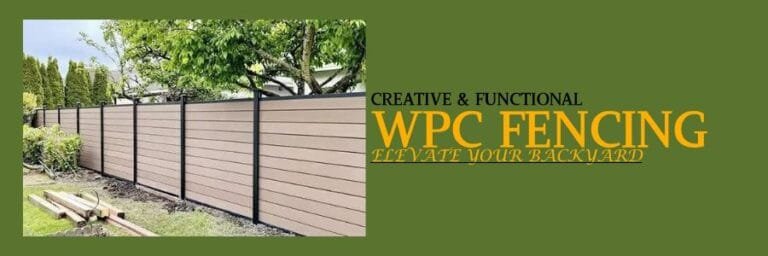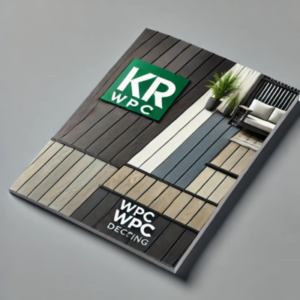Introduction: Introduction to KR AluCore™ Decking
Do you know that standard WPC requires 30cm to 40cm of joist spacing for structural support? With the modern KR AluCore™ Decking technology, the joist now spans 60cm to 80cm without the need for substructure reinforcement. That’s a significant leap in structural strength, which caters to the demanding outdoor environments where higher load-bearing capability is necessary to prevent bending or sagging.
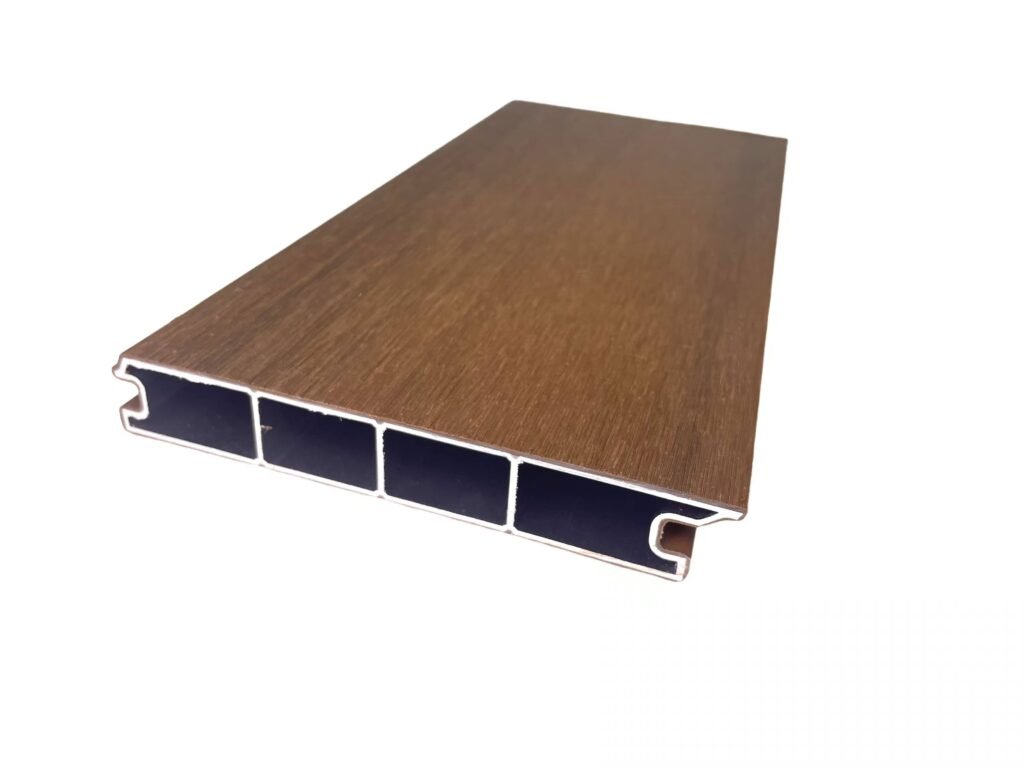
KR has mastered the fourth generation of WPC (Wood Plastic Composite) material through the introduction of AluCore™ technology. They have an in-house design department that introduces new product styles and maintains 335 WPC molds, enabling continuous innovation.
This post focuses on their latest technology and how it is the future material for outdoor construction. It will explain how AluCore™ differs from other deckings, its applications, quality control, sustainability, and customization options, catering to customer demand. Let’s learn how KR WPC takes composite decking material to a whole new level of strength with AluCore™.
What Makes AluCore™ Decking Different?
The AluCore™ decking by KR WPC utilizes aluminum material to increase its strength. The aluminum with a specific proprietary geometry is embedded within the WPC material to increase its structural strength. The result is:
Twice the Span
Using an aluminum metal core gives WPC decking enhanced structural integrity and strength. It drastically reduces the need for joists. AluCore™ decking requires a reinforcement structure every 60-80cm, which is a 100% increment from the traditional WPC decking. The aluminum material itself has a high modulus of elasticity. It is the measure of a material’s ability to stretch or compress under stress. The addition of aluminum increases the WPC deckings’ overall stiffness, thus allowing longer spans. Here are the advantages of having a longer span:
- Few Joints and Beams: The material cost of installing joints and the labour hours are drastically reduced with the AluCore™ technology, making it economically feasible.
- Enhanced Aesthetic: Longer decks provide a cleaner and more minimalist visual appeal. The longer spans also enable engineers and designers to create innovative structures.
- Improved Durability: Lower use of joints and material leads to a higher reliability and lifespan of the structure.
Near-Zero Thermal Expansion
The expansion of material during a change in temperature leads to numerous installation limitations and potential effects on material durability. Substandard installation of traditional WPC can lead to warping, shrinking, or gapping in the decking. The environmental conditions will directly impact the deck’s length and size. It can lead to unwanted gaps, which affect the aesthetic appeal.
AluCore™ solves the thermal expansion problem by utilizing aluminum at its core. A traditional WPC will exhibit a coefficient of thermal expansion (CTE) in the range of 6 × 10⁻⁶ K⁻¹. In comparison, Aluminum has a CTE of 23 × 10⁻⁶ K⁻¹. The difference is drastic, which allows their combination in AluCore™ to exhibit near-zero thermal expansion. Here are the advantages of having near-zero thermal expansion:
- Stable Dimensions: Without the thermal expansion, the decking can be gap-free and uniform even in extreme heat or cold conditions.
- Thermal Fatigue: The frequent change in shapes due to changing temperatures, which can happen between day and night, can cause thermal fatigue. It can lead to early failure of the material.
Enhanced Load-Bearing Capacity
The load-bearing capability of traditional WPC boards is higher. Zhao, Xi, and Wang (2021) discuss the mechanical performance of aluminum-reinforced wood plastic composites through experimentation, revealing that the AluCore™ material has a tensile strength 9.5 times that of traditional WPC. It makes the material ideal for high-volume and commercial applications where higher loads are expected. Through experimental validation, it was found that AluCore™ decking showed significantly higher ultimate load than traditional WPCs, with the average ultimate load being 66.75% higher.
The enhancement in load-bearing capacity results in lighter oards with higher performance, longer spans, better flexural strength, and lower costs.
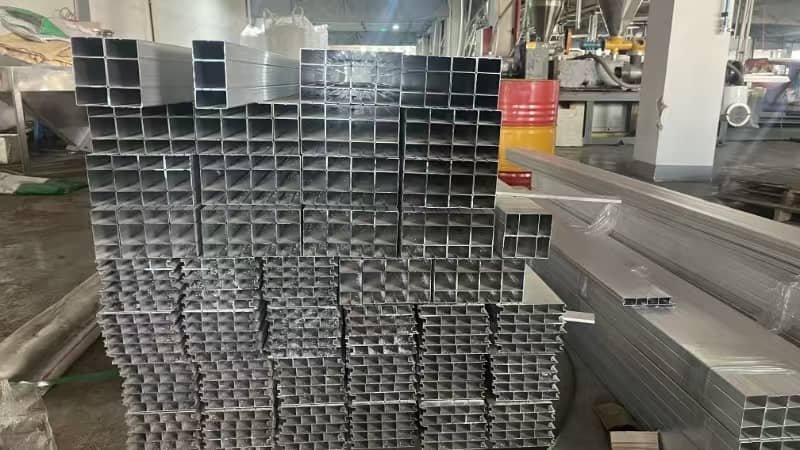
Applications for AluCore™ Decking
❖ Ideal for Commercial and Public Spaces
A location with high traffic can be challenging for the infrastructure. The cyclic loading is higher, and there is less control over their usage. Residential decks are designed to meet the minimum requirement of 40 to 60 pounds per square foot (psf). Whereas, for outdoor restaurant patios or amphitheater seating, the deck material should handle a minimum live load of 100 psf or more. That’s a greater than 100% increase in strength requirement. Using a traditional deck can result in earlier failure.

Using AluCore™, which provides 9.5 times (850%) higher tensile strength in comparison to the traditional WPC. The increase in strength makes it best suited for pool decks, resort platforms, and other large-span outdoor installations.
❖ Perfect for Poolside and High-Humidity Zones
Using KR WPC AluCore™ for outdoor construction, such as poolside and high-humidity zones. Its ability to provide a non-slip surface leads to a lower risk of poolside slips. Its strength and ability to maintain its color and aesthetic appeal under high-humidity conditions are unlike those of the traditional WPC. Moreover, the presence of aluminum inside the WPC material makes it resistant to mold, mildew, and rot, which is common in conventional WPC material used around high-humidity areas such as pool sides. Aluminum is resistant to corrosion, which makes it great for pool chemicals such as chlorine, prolonging the life of the deck.
❖ Luxury Residential and Architectural Projects
WPC is a high-end material typically installed in upscale residential areas. They provide a homogenous look with wood grain structures that can mimic wood while providing the resilience of composite material. However, the AluCore™ takes the performance and aesthetic appeal up a notch. Its ability to have longer spans and fewer supports with minimal gaps gives it a clean and sleek aesthetic. It is the ideal material for modern upscale residential developments. The use of aluminum as a core eliminates the common issues of deformation or warping, ensuring that the decking remains visually appealing and durable over time.
KR WPC’s Commitment to Quality and Sustainability
KR WPC has been in operation for decades, with global exports to over 24 countries, including the UK, Australia, Korea, Brazil, and others, highlighting its production capabilities. Their compliance with all modern certifications and techniques ensures their manufacturing is committed to quality and sustainability. KR WPC offers the following certifications:
- ISO 9001: Demonstrates adherence to a robust quality management system, ensuring consistent product quality and customer satisfaction.
- CE Marking: Indicates conformity with European Union health, safety, and environmental protection standards, allowing products to be marketed within the European Economic Area.
- FSC Certification: Affirms that the wood fibers used in KR WPC products are sourced from responsibly managed forests, promoting sustainable forestry practices.
- EN 15534: European standard for wood-plastic composite products, ensuring performance criteria such as water resistance, minimal swelling, and excellent indentation resistance.
- EN 13501-1 Class BFL-S1: Fire safety classification indicating that KR WPC products have superior flame retardancy, suitable for various applications, including commercial and residential projects.
- ASTM D7031, D7032, D6109: American standards for wood-plastic composite decking, ensuring compliance with performance criteria such as flexural strength, modulus of elasticity, and UV resistance.
- ASEAN Standards: Compliance with regional standards in Southeast Asia, including BCA Singapore and TIS Thailand, ensuring suitability for tropical climates and conditions.
The AluCore™ material is manufactured using sustainable raw materials such as wood flour and polyolefin-based plastics. They utlize energy-efficient manufacturing processes to produce products that are long-lasting and resistant to moisture, UV radiation, and thermal expansion.
Comparing AluCore™ Decking with Traditional WPC Decking
| Property | Traditional WPC | AluCore™ Decking | Advantages of AluCore™ |
| Structural Span | 30-40 cm joist spacing | 60-80 cm joist spacing | 100% Increase in Span: Fewer joists, cleaner aesthetics, reduced material costs. |
| Thermal Expansion (CTE) | 6 × 10⁻⁶ K⁻¹ | Near-zero (due to aluminum core) | Near-Zero Expansion: Prevents warping, maintains stable dimensions. |
| Weight | Heavier plastic content | Lighter due to the aluminum core | Lighter & Stronger: Easier to handle, reduces structural load. |
| Load-Bearing Capacity | Lower, failure in high-traffic areas | 9.5 times (850%) higher tensile strength | Enhanced Strength: Handles 100 psf, ideal for high-traffic areas. |
| Durability | Susceptible to warping, shrinking | High resistance to weather, UV, and moisture | Long-Lasting: Superior weather resistance, minimal maintenance. |
| Maintenance | Requires frequent upkeep | Low maintenance due to moisture resistance | Minimal Upkeep: Less prone to mold, mildew, and damage. |
| Aesthetic Appeal | Wood-like finish, fades over time | Clean, sleek, minimal gaps | Modern Look: Maintains appearance with no fading or warping. |
Customer-Centric Solutions: Customization Options
KR WPC not only offers the structural strength of AluCore™ but also provides customization options tailored to the unique requirements of each client. It can be anything from unique colors to textures or wood grain finishes. Moreover, there is flexibility in size, and it is available according to customer requirements.
For businesses looking to establish their own brand or fulfill their functional needs, they can opt for OEM (Original Equipment Manufacturer) and ODM (Original Design Manufacturer) services offered by KR WPC. Customers can brand the products with their own logos, packaging, and labeling, providing flexibility for resellers and distributors. KR WPC ensures that all these services are provided while meeting international standards, including CE, ISO, and FSC.
Conclusion: Why Choose KR AluCore™ Decking
KR AluCore™ is the latest addition to the WPC decking design. It’s a technique that uses aluminum as the core, topped with the WPC material. The aluminum is set in such a way that it enhances the structural strength multi-fold in comparison to the traditional WPC material. The material strength enables longer spans, decreases the number of supports, provides near-zero thermal expansion, lowers gaps, enhances load-bearing capacity, and provides superior humidity resistance.
KR WPC, with its 17+years of experience and global presence in 120 countries, is a leading supplier for KR AluCore™ decking and WPC material. They have been major contributors to residential, commercial, and public spaces worldwide. Their adherence to global standards, such as CE, ISO, and SGS ensures their products are high-quality and sustainable. Contact KR WPC for customization in KR AluCore™ decking or OEM/ODM solutions.
FAQ
- What is KR AluCore™ Decking, and how does it differ from traditional WPC decking?
The KR AluCore™ decking uses aluminum as the core material topped with traditional wood plastic composite (WPC) material. It gives the decking superior strength, durability, corrosion resistance, and sustainability.
- How does the aluminum core in AluCore™ decking improve its durability and performance?
Aluminum has a high modulus of elasticity, giving it enhanced structural durability and performance. AluCore™ offers up to 850% higher tensile strength compared to traditional WPC, and the modulus of elasticity is 9.5 times higher than that of traditional WPC.
- How does AluCore™ Decking handle high-traffic and heavy-load outdoor areas?
The higher structural strength enables AluCore™ to handle high-traffic areas and heavy-load outdoor areas. The aluminum material makes the material resistant to bending and warping. It can handle the minimum live load of 100 psf or more for outdoor areas.
- How does KR WPC ensure the sustainability and eco-friendliness of its decking products?
Adherence to international certifications and regulations allows KR WPC to ensure sustainability and eco-friendliness. Particularly, they use recycled wood flour and plastic composites in manufacturing.
- What certifications does KR WPC hold for its decking products, and why is that important?
KR WPC minimizes carbon emissions and ensures that its products are FSC-certified, ISO-certified, and comply with CE standards for environmental impact. Moreover, SGS and RoHS certifications further verify the safety and sustainability of materials used, assuring customers of high-quality, eco-friendly decking solutions.

